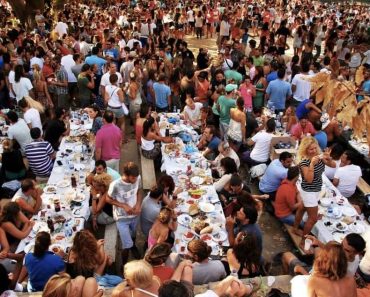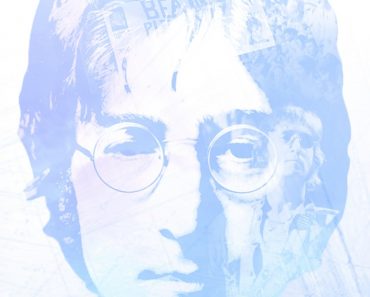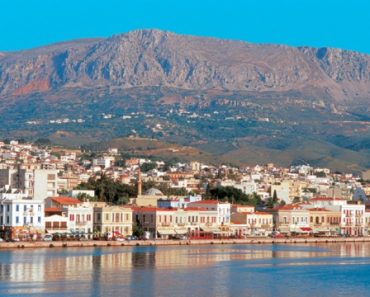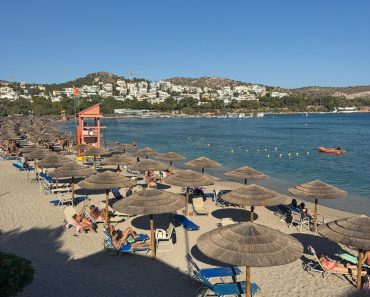
Greek opera singer Maria Callas acknowledges applause during her appearance at the Summer Opera Season in Bilbao, Spain, on September 17, 1959. [AP]
“Background of source: Source, age 21, born in New York City of Greek-American parents, went to Greece in 1937 and resided in that country until her return to the United States on the M/S Gripsholm on 15 October 1945. She attended public schools in New York City prior to going to Greece and studied music and language in Greece. Source is an opera singer though presently without employment. She is intelligent and appeared most cooperative when interviewed on 26 November 1945. Source did not hesitate to state that her sympathies were rightist.”
The excerpt is contained in a document marked “Confidential” and titled “Intelligence Report.” It is dated November 30, 1945 and is the product of a program of interviews conducted in the United States at the time with people who arrived in the country and had spent months or years in Greece. The so-called “source” is called Mary Anna Callas and was then staying at the Times Square Hotel. The subject of the report is “domestic political issues and problems.” Kathimerini reveals, for the first time, an unknown document from the so-called Vlanton Collection – comprised of US intelligence reports on occupied and immediate post-liberation Greece compiled and curated through years of work by Elias Vlanton – that adds new information about the biography of the great Greek diva.

“The Communists in Greece are well organized, but are definitely in the minority. Through ELAS [the largest and most significant of the military organizations of the Greek resistance], the Communists made one attempt to seize control and will make another attempt if given the opportunity. Greece is not ripe for free elections now or in the near future. Source believes that the alternative to the British stand in Greece is open warfare, and that no attempt should be made to force the monarchy on Greece since that would align democratic and socialist groups with the Communists,” the document says.
“Many of these ELAS recruits, source continued, were not Communists when they joined up, but were thoroughly indoctrinated while they were ‘in the hills.’”
Asked by the intelligence services about the Communists in Greece, she responds: “The Communists in Greece are extremely well organized, are armed, and are just waiting for another opportunity to attempt to seize power. The first attempt was made in 1944 when ELAS precipitated a civil war.” She then admits that “it was not her wish to give the impression that there was no effective opposition to the Germans by the Greeks during the occupation. In certain sections of Greece ELAS did do some good work as a resistance group but not around Athens.”

The document says that “if a free election were to be held, source is convinced that the Communists would make a poor showing, but a free election, in source’s opinion, would be impossible at the present time or in the near future.”
The report mentions an uncle of Callas, Dr Louris, who “was formerly a personal physician to the Royal Family of Greece. Source is presently residing with her father at 544 West 157th Street, New York City and is seeking an opportunity to pursue her operatic career in this country.”
In another comment, she tells them she “personally liked the Monarchy, she was not of the opinion that Greece was in any mood to accept a return of the King.” She is also convinced that “if the British should withdraw or show any weakening… civil war would break out again. The United States should back the British in Greece to the end that Greece will be spared open warfare.”
Maria Callas, the name by which the later diva is presented in the classified document, was born Maria Kalogeropoulou in New York City on December 4, 1923, where she attended public schools until the age of 13, when she went to Greece with her mother and sister on March 5, 1937. She began her studies at the National Conservatory, while continuing at the Athens Conservatory in the class of the Spanish soprano Elvira de Hidalgo, who guided her decisively at the beginning of her professional career. In 1940, she was hired by the newly established Royal Opera Co as an opera singer where she performed roles in seven works until her return to the United States in 1945.

Callas’ eight-year stay in Greece was decisive for her later career, even though it was during the years of German occupation. Indeed, 1944 was a very productive year for her at the Royal Opera. According to the investigative documentary “Mary, Marianna, Maria. The unknown Greek years of Callas,” by Michalis Asthenidis and Vassilis Louras, either due to envy of her great talent, or an attitude that was considered submissive to the German occupation forces, Athens’ Liberation Day was traumatic for the soprano. Arriving at the Royal Opera that day, it is said that she met a group in the foyer that supported the Communist Party. They attacked her, saying: “Who are you? What did you do in the war? You have no place here!”
Later she got a job in the Secret Correspondence Office of the British Headquarters, in the Army Share Fund Building in Syntagma. Until the outbreak of the Dekemvriana (an armed conflict that took place in Athens in December 1944, between EAM/ELAS and Greek government and British forces), her social circle centered around British Lieutenant Raymond Morgan. When the clashes began, Callas, who lived on Patission Street – the epicenter of the fighting between ELAS and the British forces – remembered that it took her 12 hours to reach the British Headquarters, in Syntagma. “It was one of the most dramatic days of my life,” she said in a later interview.
A blatant injustice against her by the management of the Royal Opera, resulting from personal animosity, revived Callas’ desire to return to the US. Thus, despite the objections of her friends, who believed that in the US she would be starting her career from scratch, and after tearing up her contract in front of the then director of the opera, Thodoris Synadinos, Callas set off for New York in the autumn of 1945. It was the journey that ultimately led her to the top of world opera.







